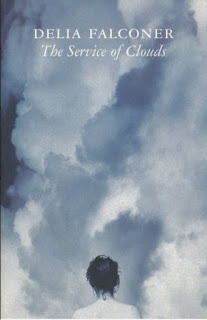The Service of Clouds
Delia Falconer's first novel was published to great success in 1997, being shortlisted for the Miles Franklin Award in 1998, and reviewed favourably in the New York Times that same year. To me, this book seems to have been around for a long time - perhaps it is because it is the sort of book that appeared on a thinking person's bookshelf, or because I have seen it numerous times in the one house (a friend's cottage in the Blue Mountains, appropriately). Or perhaps it is the subject matter, and that sense of age that comes with moss and mist, and the slow time of the setting - we begin a little earlier than this in introducing the characters, but essentially this is 1907 in Katoomba, with young and delicate unrequited love. Even without reading the review comparisons, the Marquez-like magical realism, or the Australian version thereof - is seen in the spirit-seeking Aunts protagonist Eureka lives with. On another level, the Blue Mountains and the Hydro Majestic in particular, feel like those down-river places of temporary glory and long decay that so strike in Marquez's Columbia. The following excerpt gives you a sense of this last point:
The Hydro Majestic was turreted and turbaned as an elephant house. It was longer that the Gare d'Orsay in Paris and on these grey winter afternoons when the clouds gathered it was not difficult to imagine that its cavernous halls harboured some great smoking train which might burst for the to rush towards the clockface of the sun ... In copper tanks in the pumproom were stored the mineral waters of Baden-Baden which had curdled on their exposure to the mountain climate (p.101).
Eureka is the narrator as well as protagonist, and much of the story revolves around her withdrawal from life following the great romantic and disappointing but enduring love for a god-seeking photographer, Harry Kitchings. Later, she finds sexual union with another man, a consumptive who appears to be much older (but perhaps her spirit is already old, as she thinks of herself as a spinster in a time when to be thrown-over once, even delicately, was an everlasting shame). Between these loves, there is much talk of clouds and the evocation of an era where temporary glory gave way to care for returning soldiers. One senses the same feeling as country towns give in New South Wales, that a generation went away and didn't come back; that the new buildings of the optimistic newly independent former-colony seemed already belated in the post-war years.
I will confess to approaching this novel twice to read it through, and taking a little time to do so. But I am glad I persevered - it's not a novel for the faint-hearted - it requires some determination in an era of plot-driven novels and a desire for some ongoing 'payoff'. I did feel, always, in the hands of a very talented writer, someone who recalls an earlier era - and comparisons to Marquez and Ondaatje would do well to add Patrick White as a literary forebear. I wonder what masterpiece she has been slowly working on since, or was the literary debut just too hard to follow up on, so polished was it for a first novel and so well acclaimed?




Comments
Post a Comment